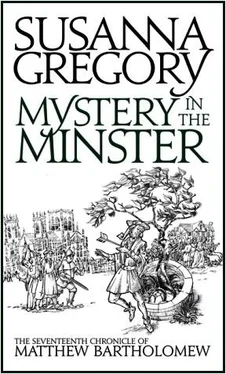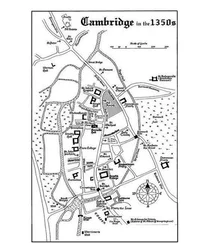‘It is all right, William,’ the lady was whispering encouragingly. ‘I am here, and so is Fournays. We will look after you.’
Once the patient was immobile, removing the arrow was easy. The wound bled copiously, but Bartholomew hoped this would serve to wash out any dirt. Unfortunately, it also meant the patient would bleed to death if he was carried home before it was sutured, so Bartholomew decided to complete the task in the street. He enlarged the hole slightly so that he could see what he was doing, found needle and thread, and began the laborious process of repairing damaged blood vessels and layers of muscle. William fainted, leaving Bartholomew’s assistants free to talk.
‘Did anyone see what happened?’ asked Fournays. He glanced at the woman. ‘Lady Helen?’
‘Yes, but I cannot credit it,’ replied Helen, in a voice that was unsteady with shock. ‘William and this surgeon were admiring the minster, when an arrow just thudded into him.’
‘Who could have done such a terrible thing?’ asked one of the crowd, before Bartholomew could inform her that he was nothing of the kind. The speaker was Prior Chozaico. Anketil was at his side, and both had evidently hurried back when they had heard the commotion, because they were breathing hard. ‘I thought everyone liked Sir William.’
‘Even if we knew, we would not tell you ,’ came an unpleasant response. Bartholomew glanced up to see that the speaker was Ellis, surrounded by vicars-choral, none of whom displayed any surprise or embarrassment at the remark. ‘You are French spies!’
When virtually every onlooker growled agreement, the two monks made themselves scarce. Bartholomew did not blame them: crowds turned quickly into mobs when there was a scapegoat to hand, and he could tell by the response Ellis’s words had provoked that the reports describing the city’s hostility towards a foundation thought to be working for the enemy had not been exaggerated.
He finished suturing a vein, and clipped off the ends of the twine with tiny but very sharp scissors. He started to reach for more thread, only to find Fournays ready with it. At this point, the spectators craned forward so eagerly that they blocked his light. Fournays ordered them back, and while he waited for them to oblige, Bartholomew noticed that the lawyer Dalfeld and the two nuns from the Abbot’s solar were among them, along with his Michaelhouse colleagues.
Michael’s face was a mask of dismay; clearly he was anticipating the trouble that would ensue when it became known that a physician, not a surgeon, was publicly conducting grisly procedures on the minster’s advocatus ecclesiae . Radeford was more interested in gazing at Isabella, while Langelee was pale, shocked by the assault on his old friend. He bent to whisper in Bartholomew’s ear.
‘Will he survive?’
Bartholomew raised his hands in a shrug. ‘I hope so, but it is too soon to say for certain.’
Langelee gripped his shoulder hard. ‘Do your best for him. He is a good man.’
As Sir William was still insensible and did not need to be held, Lady Helen stood on wobbly legs. A number of men immediately rushed to steady her, but she declined their hands and aimed for Isabella instead, who received her with a comforting hug. Bartholomew recalled that Langelee had mentioned a cousin of Isabella’s named Helen.
‘Helen’s distress is understandable,’ Fournays whispered to the physician. ‘She and Sir William were close until recently. We all thought they would marry, which would have been good for the city – they belong to opposing factions, you see, so it would have brought a measure of peace – but they changed their minds. They remain fond of each other, though.’
Bartholomew wondered how the knight could have let such a woman slip through his fingers, quite forgetting that he had done much the same with Matilde. He said nothing as he continued to stitch, listening with half an ear to the discussion taking place above his head.
‘The apprentices practise in the butts on a Monday,’ one of the vicars was saying. ‘So there are weapons everywhere. It would be easy for anyone to lay hold of one.’
‘Is there anything special about the arrow?’ Dalfeld shrugged when everyone regarded him in bemusement. ‘They are often distinctive, and may allow us to identify the man who shot it.’
Cynric handed it to him. Haughtily, the lawyer took it between thumb and forefinger, and made a show of examining it. The crowd waited in tense expectation for his verdict, although Bartholomew noticed several nudging each other and smirking at the sorry state of his clothes.
‘The barb is unique,’ Dalfeld announced eventually. ‘See how the tips are flattened?’
‘They were crushed when the arrow was removed from Sir William,’ said Cynric dismissively. ‘By the forceps. Obviously, they were not that shape when they struck.’
‘You mean you destroyed evidence that may allow us to catch a murderer?’ demanded Dalfeld. It was a remark made purely to repay Cynric for making him look foolish, but a murmur of suspicion rippled through the onlookers, and Bartholomew felt decidedly uneasy.
‘Of course not,’ said Fournays firmly, cutting it off. ‘Obviously, it was better to damage the arrow than to further damage the patient.’
Meanwhile, Langelee was scanning the area with the eye of a professional. ‘The bowman could have loosed the weapon from anywhere, but the most likely place is there.’
He pointed to a church that sat curiously close to the eastern end of the minster. It had probably once been handsome, but was now derelict: its window shutters were rotting, ivy grew over its roof, and pigeons roosted in the cracks that yawned in its crumbling tower.
‘St Mary ad Valvas?’ asked Lady Helen in surprise. ‘I sincerely doubt it! That place is cursed, and no one goes in it for any reason.’
‘It does have a reputation,’ agreed Isabella. She glanced at Langelee. ‘It is odd that you should single it out, because it has a slight connection to Michaelhouse. As you know, John Cotyngham is the current vicar of Huntington, but before that, he was priest at St Mary ad Valvas.’
‘A strange dedication,’ mused Michael. ‘Do I understand from the Latin that it has a sliding door? Perhaps a similar contrivance to the rollable stone that sealed Jesus’s tomb?’
‘Yes, it did,’ replied Isabella. ‘But it fell into disrepair years ago.’
‘Regardless, it is the perfect place for an ambush,’ said Langelee, still staring at it. ‘An archer could stand in there and no one would see him.’
‘But who would want to kill Sir William Longton?’ asked Fournays. ‘He is one of the most popular men in York.’
‘Yes, but his brother is not,’ said Dalfeld slyly. ‘ John Longton has enemies galore.’
When the last stitch was in place, Fournays helped Bartholomew dress the wound, and they finished just as William opened pain-filled eyes. Helen crouched next to him, muttering reassurances; the knight smiled gratefully and squeezed her fingers.
Knowing the patient was going to be in for an uncomfortable time as he was carried home, no matter how careful the bearers, Bartholomew helped him sip a powerful soporific. It was not long before the knight’s eyes closed a second time, although he struggled to open them when someone began shoving through the crowd in a manner that was rudely aggressive.
‘Is it true?’ the newcomer demanded. ‘Someone has attacked my brother?’
There was a resemblance between him and the casualty, but the older man’s brusque manner could not have been more different from William’s amiable dignity. Moreover, his face was florid from high living, and he was unsteady on his feet, despite the fact that it was not yet noon. He was accompanied by companions who were also far from sober, all of whom wore clothes that said they were wealthy.
Читать дальше












